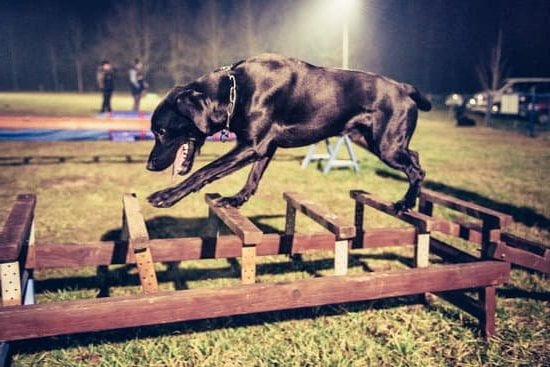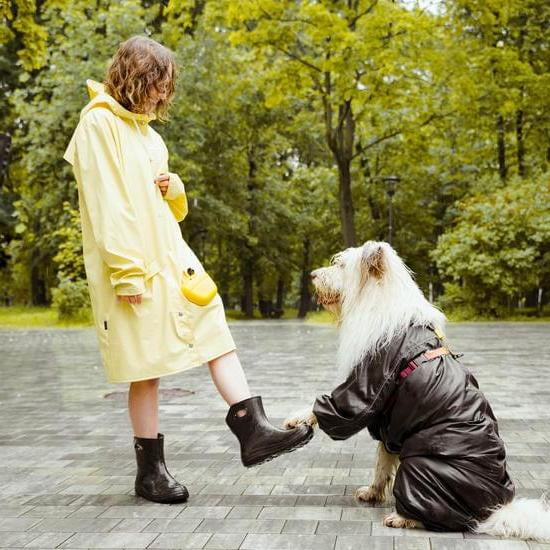When it comes to training dogs, there is a commonly held belief that older dogs are set in their ways and cannot be taught new tricks. However, this myth has been debunked by countless success stories of senior dogs learning new skills and behaviors. In this article, we will explore the idea of whether or not older dogs can be trained.
We will highlight success stories of senior dogs mastering new tricks, discuss the potential benefits of training older dogs, and address common misconceptions about their trainability. It’s time to challenge the assumption that old dogs are incapable of learning and unlock the true potential of our furry friends.
Debunking the Age Barrier
As the saying goes, “You can’t teach an old dog new tricks.” However, this common belief couldn’t be further from the truth. Older dogs are indeed capable of learning and adapting to new skills, debunking the age barrier myth. Countless success stories of senior dogs learning new tricks not only showcase their trainability but also highlight the potential benefits of training older dogs.
One way to prove that older dogs can be trained is by highlighting inspiring success stories. There are numerous accounts of senior dogs mastering new skills, whether it’s obedience training, agility courses, or even complex tricks.
These heartwarming stories serve as a testament to the fact that age does not determine a dog’s ability to learn and grow. What these success stories also emphasize is that training older dogs can have immense benefits for both the dog and its owner.
Training older dogs can offer several advantages. First, it provides mental stimulation for senior dogs, helping to keep their minds sharp and active. This mental exercise is crucial for preventing cognitive decline in older canines.
Additionally, training sessions serve as an excellent bonding opportunity between the owner and the dog. It strengthens their relationship through trust-building exercises and clear communication during training exercises. Furthermore, by teaching an older dog new skills or reinforcing existing ones, owners can also improve their overall behavior and manners.
Addressing common misconceptions about the trainability of older dogs is essential in debunking the age barrier myth. Many people believe that older dogs are set in their ways or have behavioral issues that prevent them from being trained effectively. While it is true that certain physical limitations may affect an older dog’s ability to learn certain high-energy activities or commands requiring agility, there are plenty of other skills they can acquire with patience and consistency.
By highlighting success stories of senior dogs learning new skills, discussing the potential benefits of training older dogs and addressing common misconceptions about their trainability, it becomes evident that the age barrier is nothing more than a myth. Older dogs are capable of learning and adapting to new skills, benefiting both themselves and their owners.
Understanding the Unique Challenges of Training Older Dogs
Training older dogs may come with unique challenges that pet owners need to be aware of. As dogs age, they may experience physical limitations that can affect their ability to learn and perform certain tasks. Additionally, older dogs may have behavioral issues that require special attention and training techniques. Understanding these challenges and how to overcome them is crucial for successful training.
One challenge when training older dogs is the possibility of physical limitations. As dogs age, they may develop joint problems or experience a decline in overall health. These physical conditions can make it more difficult for them to perform certain movements or follow instructions during training sessions.
For example, an older dog with arthritis may struggle with agility exercises that require jumping or quick movements. It is important for owners to be mindful of their dog’s physical capabilities and modify training exercises accordingly.
Another common challenge when training older dogs is addressing behavioral issues that may arise with age. Some older dogs may develop separation anxiety, aggression, or even cognitive impairments. These behavioral issues can impact their ability to focus and respond appropriately during training sessions. Patience and consistency are key when working with older dogs experiencing these issues. Employing positive reinforcement techniques and seeking professional guidance if needed can help overcome these challenges.
To manage expectations when training older dogs, it is important for owners to understand that learning may take longer compared to younger dogs. Older dogs have established routines and habits, which can make it harder for them to adopt new behaviors. Training sessions should be kept short and engaging, focusing on small steps of progress rather than expecting immediate mastery of commands or tricks.
It is essential for owners to approach training older dogs with kindness and understanding. By considering the unique challenges they face due to physical limitations and potential behavioral issues, pet owners can tailor their approach to ensure a positive learning experience for their furry companions.
| Physical Limitations | Behavioral Issues |
|---|---|
| Physical conditions like arthritis may affect performance during training | Older dogs may develop separation anxiety or aggression, impacting their focus during training sessions |
| Modifying exercises to accommodate physical limitations is necessary | Positive reinforcement and seeking professional guidance can help overcome behavioral challenges |
| Acknowledging that learning may take longer compared to younger dogs | Keeping training sessions short, engaging, and focused on small steps of progress |
Patience is Key
Training older dogs requires a patient and tailored approach to ensure success. While it may be tempting to rely on traditional training techniques designed for puppies, it is important to understand that older dogs have unique needs and limitations. By taking the time to understand these factors, owners can create an effective training plan that meets the specific needs of their older canine companions.
One crucial aspect of training older dogs is the use of positive reinforcement. This involves rewarding desired behaviors with treats, praise, or playtime. Positive reinforcement not only motivates older dogs to learn but also strengthens the bond between owner and dog. Consistency is key in this process – by consistently rewarding desired behaviors and ignoring unwanted ones, owners can communicate clearly with their older dogs and help them understand expectations.
An individualized approach is also essential when training older dogs. Each dog has its own personality, learning style, and physical abilities. Owners should take these factors into account when designing a training program for their senior pets. For example, some older dogs may have limited mobility due to arthritis or other health conditions. In such cases, adjusting exercises or using alternative methods can ensure that the dog remains engaged without causing discomfort or putting excessive strain on their bodies.
- It’s important to remember that every achievement matters – no matter how small.
- Training sessions should be short and frequent to prevent mental exhaustion.
- Varying the types of exercises keeps things interesting for both dog and owner.
By tailoring training techniques for older dogs, owners can overcome age-related challenges while maximizing their pet’s potential. Success stories abound – many senior dogs have mastered new skills and even excelled in obedience or agility competitions. With patience, consistency, positive reinforcement, and an understanding of each dog’s unique capabilities, owners can unlock remarkable achievements in their aging companions and create a fulfilling training experience for both parties involved.
The Power of Bonding
Training isn’t just about teaching your dog new tricks or commands; it’s also an incredible opportunity to strengthen the bond between you and your furry companion. When it comes to older dogs, training can serve as a powerful tool for enhancing the owner-dog relationship and creating a deeper connection.
One of the key benefits of training older dogs is that it provides an avenue for increased communication and trust-building between both parties. By engaging in regular training sessions, you are actively working together towards a common goal, fostering teamwork and cooperation. This shared experience can help solidify the bond you have with your older dog and create a sense of mutual understanding.
To effectively build trust during training sessions, it’s essential to establish clear communication with your older dog. Use positive reinforcement techniques, such as treats, praise, or playtime rewards, to motivate and encourage good behavior. By focusing on positive reinforcement rather than punishment or scolding, you create a safe and encouraging environment for your dog to learn and grow.
In addition to building trust, training also has significant emotional benefits for both the dog and the owner. For older dogs, learning new skills can provide mental stimulation and keep their minds active. It helps prevent cognitive decline, resulting in healthier aging. Similarly, as an owner, seeing your older dog successfully learn something new can be immensely rewarding and uplifting. It strengthens the bond between you through shared achievements and boosts both your confidence.
Overall, training presents a unique opportunity for deepening your relationship with your older dog. Through open communication, positive reinforcement techniques, and shared accomplishments, you can enhance trust, understanding, and emotional connections. Embrace this chance to bond with your senior canine companion while simultaneously teaching them valuable skills that will benefit them throughout their lives.
The Role of Physical Health in Training Older Dogs
Exploring the impact of exercise and diet on older dogs’ trainability
When it comes to training older dogs, physical health plays a crucial role in their overall trainability. Just like humans, as dogs age, they may experience various physical changes that can affect their ability to learn new skills. Exercise and diet are two key factors that can significantly impact an older dog’s trainability.
Regular exercise is essential for maintaining both the physical and mental well-being of older dogs. Engaging in activities such as daily walks or low-impact exercises can help keep their muscles toned, improve cardiovascular health, and provide mental stimulation. Adequate exercise helps prevent weight gain and reduces the risk of obesity-related health issues, which can negatively impact a dog’s energy levels and motivation to learn during training sessions.
Similarly, a well-balanced diet tailored to the specific nutritional needs of senior dogs is crucial for their overall health and cognitive function. Providing the right nutrients can support cognitive function, promote joint health, and maintain optimal energy levels needed for successful training. Consultation with a veterinarian is recommended to determine the appropriate diet plan for your aging canine companion.
Highlighting the importance of regular veterinary check-ups for successful training
Regular veterinary check-ups are vital for ensuring older dogs are capable of participating in training activities effectively. As dogs age, they may develop medical conditions or experience age-related changes that could affect their ability to learn or perform certain tasks. By regularly visiting a veterinarian, any potential health issues can be identified early on and appropriate measures taken to manage them.
During these check-ups, veterinarians can assess an older dog’s physical condition, identify any signs of discomfort or pain, monitor joint mobility, and address any concerns about hearing or vision loss. Through these examinations, potential obstacles to training can be identified and managed proactively.
Addressing potential health conditions that may affect training and offering solutions
Certain health conditions commonly encountered in older dogs can affect their trainability. For example, hearing loss or diminished eyesight can impact their ability to respond to verbal or visual cues during training. In such cases, it is important to modify training techniques by incorporating alternative communication methods that focus on hand signals or scent cues.
Additionally, arthritis or other joint-related issues may limit a dog’s mobility and make certain physical tasks uncomfortable or painful. To address this, training exercises should be modified to avoid placing excessive strain on affected joints. Incorporating low-impact exercises, using ramps for obstacle courses, or providing support aids such as orthopedic beds or harnesses can help alleviate discomfort and enable older dogs to participate more fully in training.
By understanding the impact of physical health on an older dog’s trainability and taking appropriate steps to optimize their well-being through exercise, nutrition, regular veterinary check-ups, and modifications based on specific health conditions, owners can create an environment conducive to successful and enjoyable training sessions with their aging canine companions.
Breaking Down Age-related Stereotypes
In this section, we will focus on breaking down age-related stereotypes and emphasizing the capabilities of older dogs. It is important to challenge the commonly held belief that older dogs are unable to learn new things or be trained effectively. By sharing inspirational stories and discussing specific areas in which older dogs can excel, we hope to empower readers to see the true potential of their senior canine companions.
Sharing Inspirational Stories
One powerful way to challenge age-related stereotypes is by sharing inspirational stories of older dogs achieving remarkable training accomplishments. These stories not only serve as a source of motivation but also demonstrate that it is never too late for a dog to learn and grow.
For example, there have been cases where senior dogs have successfully completed complex obedience or agility training programs, defying expectations and inspiring their owners. By highlighting these success stories, we can provide evidence that supports the idea that older dogs are just as capable as their younger counterparts when it comes to training.
Specific Training Areas for Older Dogs
While it may be true that older dogs can face certain physical limitations, they can often excel in specific training areas that align with their abilities and interests. For instance, many senior dogs have exceptional recall skills and can be highly reliable off-leash.
Additionally, older dogs tend to have a strong foundation in basic commands such as sit, stay, and lie down due to their life experiences. This makes them excellent candidates for more advanced obedience training or even specialized tasks such as therapy work or scent detection.
Furthermore, some senior dogs enjoy engaging in low-impact activities like nose work exercises or puzzle toys that stimulate their minds without placing excessive strain on their bodies. By recognizing these unique strengths and tailoring our training approach accordingly, we can unlock the full potential of older dogs and help them thrive in new areas of learning.
Encouraging Confidence in Older Dog Owners
It is not uncommon for owners of older dogs to feel discouraged or believe that their dog’s age is a barrier to training success. However, it is essential to encourage confidence in owners and remind them that their senior dogs have the capability to surprise them with their abilities.
By providing resources, guidance, and support, we can help owners navigate the training process with optimism and patience. It is important to reinforce the idea that age should never be a limiting factor when it comes to a dog’s capacity for learning and growth.
By breaking down age-related stereotypes and emphasizing the capabilities of older dogs, we can inspire readers to approach training with their senior companions in a positive and empowering manner. With the right mindset, tailored training techniques, and an understanding of their unique strengths, older dogs can continue to thrive mentally and physically through ongoing learning experiences.
Practical Tips for Training an Older Dog
Training an older dog can be a fulfilling and rewarding experience for both the owner and the canine companion. While it may require some adjustments and considerations, there are practical tips that can help make the training process smoother and more effective.
One crucial step in training an older dog is to establish a consistent routine. Older dogs often thrive on structure, so creating a schedule with dedicated training sessions can provide them with a sense of security and predictability. Designate specific times each day for training, keeping the sessions short and focused to maintain their attention and prevent fatigue.
When it comes to selecting training tools, it’s essential to choose ones that are suitable for older dogs. For example, using treats as rewards can be highly effective in motivating senior dogs during training sessions. Opt for smaller, soft treats that are easy for them to chew and digest. Additionally, consider using tools such as clickers or verbal cues to provide clear communication and reinforce desired behaviors.
Consistency is key when training an older dog. It’s important to use consistent verbal commands and hand signals throughout the training process. Ensure that everyone involved in the dog’s care follows the same set of commands to avoid confusion or mixed messages.
Patience is paramount when working with older dogs. Understand that they may take longer to grasp new concepts or perform specific tasks due to physical limitations or cognitive changes associated with aging. Celebrate small victories along the way, as progress may come in steps rather than leaps.
By following these practical tips, owners can create an environment conducive to successful training sessions with their older dogs. Remember that every dog is unique, so tailor these techniques as needed based on your dog’s individual needs and abilities. With patience, consistency, and dedication, it is possible to unlock the potential of older dogs through effective training methods.
Conclusion
In conclusion, it is evident that the age barrier when it comes to dog training is nothing more than a myth. Throughout this article, we have debunked common misconceptions about older dogs’ trainability and highlighted numerous success stories of senior dogs learning new skills. By understanding the unique challenges that come with training older dogs and tailoring training techniques to their individual needs, owners can unlock the full potential of their furry companions.
One key takeaway from this article is the importance of patience in training older dogs. Positive reinforcement and consistent training are essential for helping them learn and overcome any physical or behavioral limitations they may have. It is crucial for owners to approach training with an open mind and be willing to adapt to their dogs’ specific needs.
Furthermore, training is not only about teaching commands but also about building a strong bond between owner and dog. Through training sessions, trust and communication can be strengthened, enhancing the overall relationship between both parties. Older dogs have a great capacity for learning and growing, so it is important not to underestimate their potential.
To empower owners in their journey of training older dogs, practical tips should be followed. Establishing a regular routine, utilizing useful training tools and resources, and maintaining consistency and patience throughout the process are all crucial elements for successful training sessions.
Frequently Asked Questions
Is it harder to train a dog the older it gets?
Training a dog can be more challenging as it gets older, but it is not necessarily harder. While puppies may have a higher capacity for learning and may be more impressionable, older dogs can still learn new behaviors and commands. The key lies in adapting the training methods to suit their age and abilities.
Older dogs may have established habits and behaviors that need to be unlearned, which requires patience and persistence. However, with proper training techniques, consistency, positive reinforcement, and realistic expectations, it is absolutely possible to train an older dog.
Can a 7 year old dog be trained?
Yes, a 7-year-old dog can definitely be trained. Dogs of any age have the potential to learn new things and adapt their behavior. While they may have developed certain habits or patterns over time, with consistent training and positive reinforcement methods, you can effectively teach them new commands or modify their existing behavior.
Patience is particularly important when working with older dogs since they might require more time to grasp new concepts compared to younger animals. Nevertheless, by creating a structured training routine that considers their age-related strengths and limitations, training a 7-year-old dog can lead to successful results.
Is it worth training an older dog?
Training an older dog can certainly be worth the effort. There are several benefits to training an older canine companion even if they already have some existing behaviors or habits that you would like to change or modify. Firstly, training provides mental stimulation for dogs of all ages and helps prevent boredom.
This mental exercise is crucial for their overall well-being as it helps keep their minds sharp and engaged, leading to a happier life for them. Additionally, proper training improves the bond between the owner and the dog while promoting good manners and obedience skills essential for a harmonious coexistence within your household or community. Therefore, investing time and effort into training your older dog can bring about positive changes in their behavior while enhancing your relationship with them.

Welcome to the blog! I am a professional dog trainer and have been working with dogs for many years. In this blog, I will be discussing various topics related to dog training, including tips, tricks, and advice. I hope you find this information helpful and informative. Thanks for reading!





